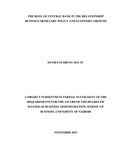| dc.description.abstract | The Central Bank of Kenya(CBK) shall be responsible for formulating monetary policy,
promoting price stability, issuing currency and promoting other functions conferred on it
by an act of parliament. Revised Constitution (2010). Achieving and maintaining a stable
and appropriate inflation rate, exchange rate and interest rate facilitates higher levels of
domestic savings and private investment and therefore leads to improved economic
growth, higher real income and increased employment opportunities.CBK monetary
policy is therefore designed to support the government’s desired economic activity and
growth as well as employment creation through achieving and maintaining a low and
stable inflation, interest rate and exchange rate.(James et al.2012).The study set to
establish the Role of Central Bank in the relationship between monetary policy and
Economic growth in Kenya. The study employed correlational research design. The study
used time series empirical data on the variables to describe and examine the relationship
between Central bank monetary policy tools and economic growth in Kenya by
establishing correlation coefficients between the Economic growth and the monetary
policy tools. The study used secondary data on the Consumer Price Index for inflation,
91-day Treasury bill rate, exchange rate, money supply (M3) and repo rate. The analyses
entailed the computation of the various coefficients of correlation denoted as ‘β’ in the
model to determine the relationship of Central Bank’s monetary policy tools to Economic
growth in Kenya. The study established that Economic growth is correlated to monetary
policy tools of Money supply,91-day Treasury bill rate, Repo rates, and exchange rates.
money supply over money demand. The study also established that exchange rate Policy
has an important role in reducing or minimizing the risk of fluctuations in exchange rates,
which will have an impact on the economy. Any changes in exchange rates will have a
great impact on the economy. The study recommends that the policy makers need to
keenly consider the levels of money supply in Kenya so as to ensure a stable retail price
levels. The study also recommends that the Government evaluate the prevailing levels of
retail prices and set the interest rates on the 91-day Treasury bills because they are
majorly treated as risk free rate hence determine other interest rates and inflation levels in
Kenya | en_US |

